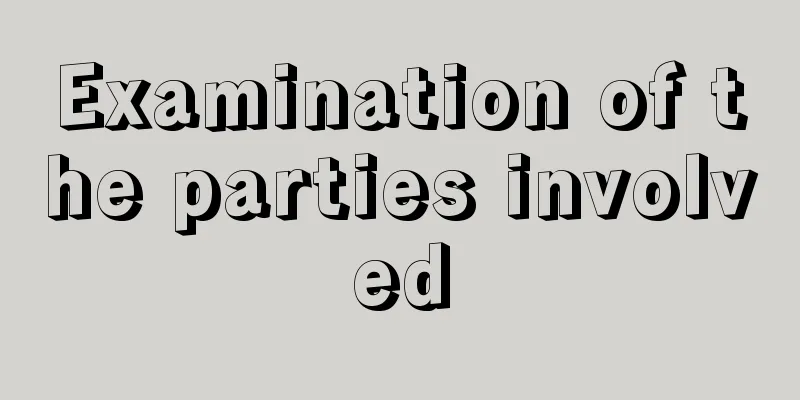Examination of the parties involved

|
In civil litigation, examination of evidence is conducted by questioning the parties themselves about the facts they have seen or heard as evidence (Civil Procedure Law, Article 207 and following). It is also called examination of the parties themselves. Examination of the parties is conducted upon petition or on the court's own initiative (Civil Procedure Law, Article 207, Paragraph 1). Since the parties are directly interested, it is doubtful whether they will tell the truth, and it is cruel to force them to give testimony in a way that is unfavorable to them. Therefore, Article 336 of the old law provided for examination of the parties when the court was unable to reach an impression through the examination of evidence (this was called the supplementary nature of examination of the parties). However, since it is the parties who know the facts best, supplementary nature was not always observed in practice. The current law abolishes supplementary nature and only requires that when examining witnesses and the parties themselves, the witness examination must be conducted first (Civil Procedure Law, Article 207, Paragraph 2). The parties are obligated to appear, take an oath, and make a statement, and the examination procedures are similar to those for the examination of witnesses, but the necessity of taking an oath, sanctions for false statements, and sanctions for refusing to appear or take an oath are less strict than those for witnesses (Articles 207, paragraph 1, 208, and 209 of the same law). In addition, the legal representatives of the parties, and the representatives and administrators of corporations, etc. are treated in the same manner as the parties themselves. [Yoshinobu Homma] [Reference] | |Source: Shogakukan Encyclopedia Nipponica About Encyclopedia Nipponica Information | Legend |
|
民事訴訟において、訴訟当事者本人を証拠方法として、その見聞した事実について尋問する証拠調べ(民事訴訟法207条以下)。本人尋問ともいう。当事者尋問は、申立てまたは職権により行う(同法207条1項)。当事者は直接の利害関係人であるから真実を述べるかどうか疑わしいし、また、その不利な面に供述を強いるのは酷であることから、旧法第336条では証拠調べによって裁判所が心証を得ることができないときに当事者尋問ができるとされた(これを当事者尋問の補充性といった)。しかし、事実関係をもっともよく知るのも当事者であるから、実務ではかならずしも補充性は守られていなかった。現行法は、補充性を廃し、証人と当事者本人の尋問を行うときは、まず証人尋問を先にするにとどめた(同法207条2項)。当事者は出頭義務、宣誓義務、陳述義務を負い、尋問手続は証人尋問のそれに準ずるが、宣誓の必要性、虚偽の陳述に対する制裁、出頭・宣誓拒否に対する制裁などについては証人のそれに比して緩められている(同法207条1項・208条・209条)。なお、当事者の法定代理人、法人等の代表者・管理人も、当事者本人に準じて扱われる。 [本間義信] [参照項目] | |出典 小学館 日本大百科全書(ニッポニカ)日本大百科全書(ニッポニカ)について 情報 | 凡例 |
<<: Parties lawsuit - Toujishasosho
>>: Inquiry of the parties involved
Recommend
Song form
...a term in musical composition referring to sim...
Viscoelasticity - Current
A mechanical property that combines elastic and v...
Benjamin [of Tudela] (English spelling)
?-1173 A Jewish rabbi and traveller born in Navarr...
GHQ Memorandum - GHQ Memorandum
A directive issued by the General Headquarters of ...
Nogi [town] - Nogi
A town in Shimotsuga County at the southern tip of...
Chiral smectic
...By mixing a small amount of cholesteric liquid...
Ypsilantis, Alexandros
Born: December 12, 1792. [Died] January 31, 1828. ...
Cut rhyme - Setin
A Chinese rhyming book. Five volumes. Compiled by...
Bundschuh (English spelling) German
A series of peasant uprisings that occurred in the...
Eight Views of Omi - Oumi Hakkei
This indicates scenic spots along the shores of L...
Takumi-ryo
〘Noun〙 (On reading of "Takumi - ryo") 1....
Oromap - Oromap
…The northwest winter monsoon has a downwind natu...
Amnesia - amnesia
〘noun〙 A type of memory disorder. The inability to...
Urea - Urea
A compound equivalent to the diamide of carbonic ...
Castro, R.
...However, in recent years, the collective leade...









![Johoku [town] - Johoku](/upload/images/67cbe061c5fe6.webp)